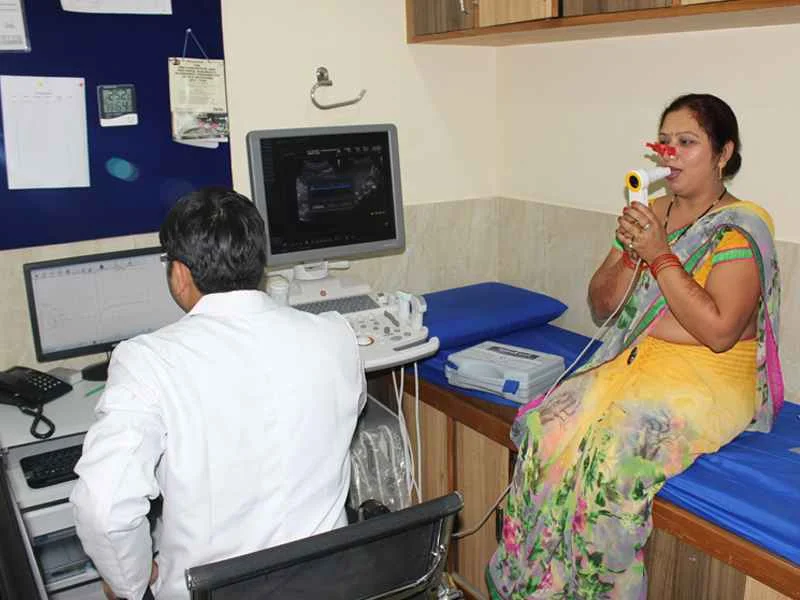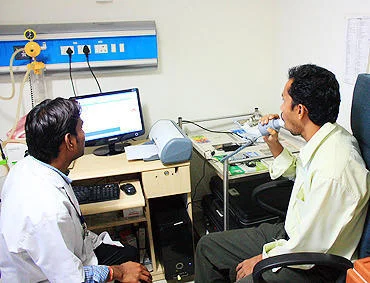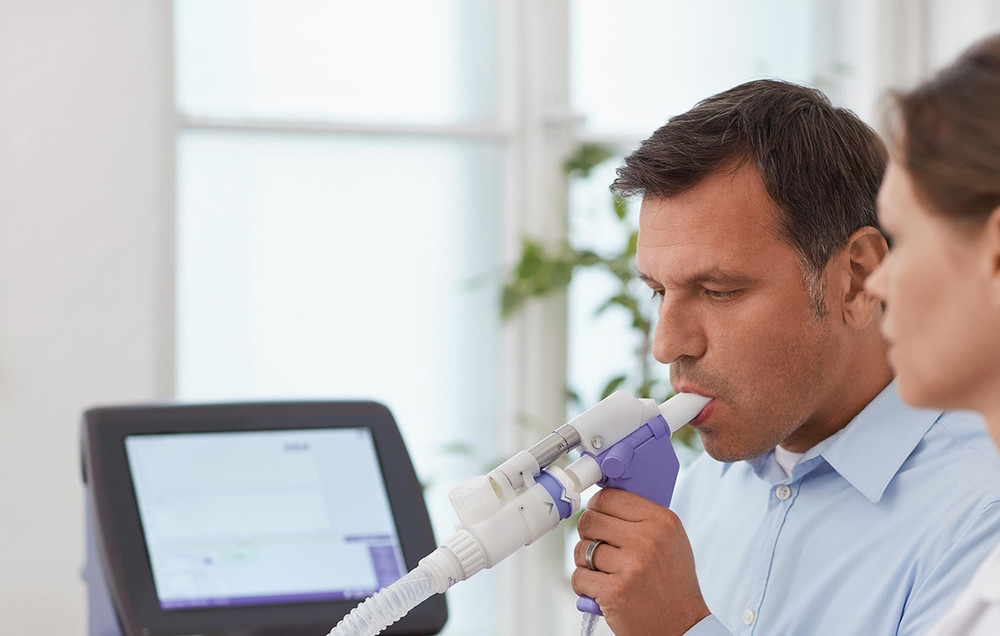Pulmonary function test in Goregaon and kandivali
What Is Pulmonary function tests (PFTs)?
Pulmonary Function Tests (PFTs) are non-invasive tests used to evaluate how well your lungs are working. They measure lung capacity, airflow, and gas exchange efficiency, helping healthcare providers diagnose and monitor lung conditions.
Key Components of PFTs
- Spirometry: Measures the amount and speed of air you inhale and exhale. It helps diagnose conditions like asthma, chronic obstructive pulmonary disease (COPD), and restrictive lung diseases.
- Lung Volume Tests: Assess the total amount of air your lungs can hold (lung capacity). These tests can identify restrictive lung conditions.
- Diffusion Capacity (DLCO): Evaluates how well oxygen moves from your lungs into your bloodstream, which can indicate conditions like pulmonary fibrosis or emphysema.
- Peak Flow Measurement: Checks the maximum speed of exhalation, often used for asthma management.

When Would You Need To Do PFT?

Diagnose lung disease
Monitor the effect of chronic diseases like asthma, chronic obstructive lung disease, or cystic fibrosis
Detect early changes in lung function
Identify narrowing in the airways
Evaluate airway bronchodilator reactivity
Show if environmental factors have harmed the lungs
Preoperative testing e lungs
What Should You Expect During PFT?

You may have your procedure as an outpatient. This means you go home the same day. Or it may be done as part of a longer stay in the hospital. The way the procedure is done may vary. It depends on your condition and your healthcare provider’s methods. In most cases, the procedure will follow this process:
- You’ll be asked to loosen tight clothing, jewellery, or other things that may cause a problem with the procedure.
- If you wear dentures, you will need to wear them during the procedure.
- You’ll need to empty your bladder before the procedure.
- You’ll sit in a chair. A soft clip will be put on your nose. This is so all of your breathing is done through your mouth, not your nose.
- You’ll be given a sterile mouthpiece that is attached to a spirometer.
- You’ll form a tight seal over the mouthpiece with your mouth. You’ll be instructed to inhale and exhale in different ways.
- You will be watched carefully during the procedure for dizziness, trouble breathing, or other problems.
- You may be given a bronchodilator after certain tests. The tests will then be repeated several minutes later, after the bronchodilator has taken effect.

How Can You Prepare For Pulmonary Function Test?
Your healthcare provider will explain the procedure to you. Ask him or her any questions you have. You may be asked to sign a consent form that gives permission to do the procedure. Read the form carefully. Ask questions if anything is not clear.
Tell your healthcare provider if you take any medicines. This includes prescriptions, over-the-counter medicines, vitamins, and herbal supplements.
Make sure to:
- Stop taking certain medicines before the procedure, if instructed by your healthcare provider.
- Stop smoking before the test, if instructed by your healthcare provider. Ask your provider how many hours before the test you should stop smoking.
- Not eat a heavy meal before the test, if instructed by your healthcare provider
- Follow any other instructions your healthcare provider gives you
Your height and weight will be recorded before the test. This is done so that your results can be accurately calculated.
By When Can You Expect Your Reports?
30-60 minutes.
Frequently Asked Questions
What does a PFT involve?
During a PFT, you will be asked to breathe into a special device called a spirometer. This device records your lung function by measuring factors like lung volume, airflow, and the exchange of oxygen and carbon dioxide.
Can anyone undergo PFTs?
PFTs are safe for most individuals, but they may not be suitable for those with certain medical conditions or recent surgeries. Your healthcare provider will assess your eligibility for the tests.
How often should PFTs be repeated?
The frequency of PFTs depends on the individual’s health condition and the guidance of their healthcare provider. They may be done periodically to monitor lung function or as needed to assess specific respiratory symptoms.
How should I prepare for the PFT test?
- Avoid smoking or heavy exercise for a few hours before your test.
- Wear loose, comfortable clothing for easy breathing.
- Follow your doctor’s advice on medications.
Can children or elderly people take this test?
Yes, PFTs can be done for people of all ages, though younger children may need extra guidance to perform the test correctly.
Is DiagnoLounge in Goregaon equipped with modern technology for PFT tests?
Yes, DiagnoLounge in Goregaon uses advanced, state-of-the-art equipment to deliver precise and reliable PFT results.
Is DiagnoLounge the best place for a PFT in Goregaon?
Yes, DiagnoLounge is trusted by patients for its state-of-the-art facilities, experienced staff, and commitment to accurate diagnostics, making it one of the best choices for PFT in Goregaon.
Can I book a Pulmonary Function Test online at Diagno Lounge?
Yes, you can easily book your PFT appointment online via our website or by calling us directly.

